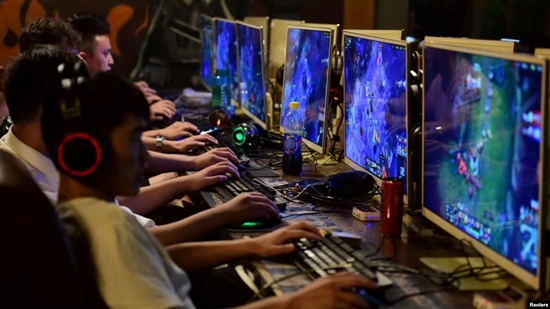
The Chinese government has been harassing makers and players of video games for years. It doesn’t want people to enjoy themselves too much or for too long. Not when people could be doing so much more edifying things like studying Xi Jinping Thought, being locked inside their apartments by lunatic curb-COVID protocols, being locked in murderous reeducation camps, banging their heads against a wall, etc.
Puritans and sadists can always find new ways to curdle merriment, so “China drafts new rules proposing restrictions on online gaming” (Associated Press, December 22, 2023).
China released draft guidelines Friday aimed at curbing excessive spending on online gaming in the latest move by the ruling Communist Party to keep control of the virtual economy.
The proposal caused shares in the biggest Chinese gaming companies, Tencent and NetEase, to plunge in Hong Kong.
China’s gaming regulator, the National Press and Publication Administration, issued guidelines saying online games cannot offer incentives for daily log-ins or purchases. Other restrictions include limiting how much users can recharge and issuing warnings for “irrational consumption behavior.”
“Irrational consumption behavior” is “consumption behavior”; in this context, play. Anybody can do anything to excess. But it’s not the proper function of government to check excessive indulgence in activities that do not violate anybody’s rights. When people are children, it’s up to parents and guardians to impose what they feel are reasonable limits on gaming. When people become older, it’s up to themselves. But respect for the social requirements of self-responsibility would destroy an authoritarian or totalitarian state.
Gamers and game companies have complained about the proposed new rules. So the National Press and Publication Administration said that “it will ‘earnestly study expressed concerns and views,’ and will further amend the rules after absorbing opinions from related government bodies, companies and users.”
Perhaps the NPPA will soften the proposed new restrictions a little bit—just enough to prevent mass rioting by gamers throughout China—while leaving them essentially unchanged.
If the opinions of “companies and users” were determinative, the Administration wouldn’t have any work to do. Game makers have never had any difficulty figuring out which of its video or online games are popular and which are dead on arrival.
A few years ago, the Chinese Communist Party limited kids to three hours of gaming a week. At least, that’s the limit that the kids have been confronted with when they log in. And many Chinese parents and children have accepted the restriction. But maybe not all. Young players smart enough to get to the nth level of a challenging quest are probably also often smart enough to find a way to play for more than three hours a week.





